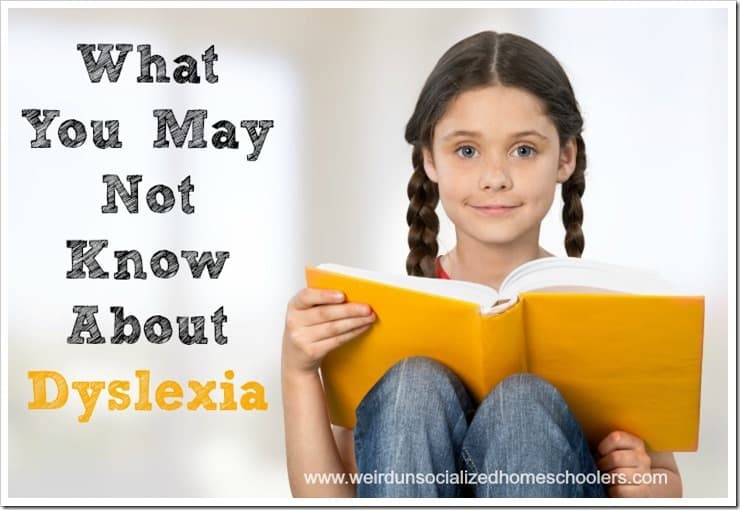What You May Not Know About Dyslexia or Your Struggling Learner
As homeschooling parents there is nothing that can send us into a tail spin quite like a child who struggles learning to read. We’ve all heard that reading is the door to learning. “Teach them to read and you’ve given them the world” and all that kind of talk.
As the homeschooling parent of 7 dyslexic kids (some of whom didn’t learn to read independently until 10-12 years old) and an Orton-Gillingham dyslexia tutor, I know that although difficult, all people with dyslexia can learn to read, write and spell with the right methods and hard work.
I also know that they are on a completely different track than the traditional learner and for us ‘just want to fit in’ types that can be hard.
I understand how bright and creative these kids are.
I know that my kids will never outgrow their dyslexia.
I also know that dyslexia is genetic and not caused by my poor parenting. Whew!
I know that my kids aren’t lazy and that they don’t need to just try harder!
I know that the dyslexic mind is wired for many strengths, including inventiveness, creativity and an amazing entrepreneurial spirit.
What You Need to Know About Dyslexia
Most people know that dyslexia affects reading and her sisters – spelling and writing. What many people don’t know (including most credentialed professional teachers) is that dyslexia can also affect the speed at which information is processed; organization; attention and focus; memory; and math ability. As many as 50% of dyslexics also have some form of attention deficit.
These many facets of dyslexia, especially when not understood by teachers, family and friends, can lead to a variety of emotional struggles for dyslexic kids such as:
A loss of confidence: A child’s early years are spent developing their self-image. If these years are full of frustrations from negative experiences with learning, feelings of inferiority will follow. The longer these negative experiences go on, the more likely that feelings powerlessness and incompetence will set in.
A loss of interest in learning: If a child is consistently performing below expectations and no matter how hard they try, they are still falling short, it is easy to understand that they may lose interest in learning.
A low tolerance for difficulty: Without regular success, kids with dyslexia can develop a low tolerance to difficulty, causing them to give up quickly when a project is perceived as being too hard.
Getting educated
So far our family has graduated 3 of our dyslexic kids and they are all finding their way, doing things they love, and living productive lives. By far, the most important thing we did to help them was to get educated about the different aspects of dyslexia and the best ways to teach our kids.
There was a steep learning curve in the early years for sure. We had to learn to weed out what worked from what didn’t work and oftentimes just learned by trial and error. You could say that we’ve test-driven most of the methods available today!
Getting educated about dyslexia is important for a variety of reasons.
1. It will help you to understand and appreciate the differences in your child and perhaps even in yourself or your spouse! Many parents have discovered for the first time their own dyslexia as they discover their child’s dyslexia.
2. It will help you to teach them in a way that the learn best making your teaching more effective and your home and school much more enjoyable.
3. It will help you teach your child to accept and even embrace their differences – looking for their God-given strengths and talents and no longer striving to fit in to a mold that they were never created for in the first place.
Parent Dyslexia Classes
Last year, out of a desire to share my knowledge and unique understanding of successfully homeschooling kids with dyslexia, I launched a new web site called Homeschooling With Dyslexia.
You can find resources, teaching tips and encouragement as well as our series of Parent Dyslexia Classes. These online classes are approximately one hour long in both video and (downloadable) audio formats. Classes currently available are:
- Understanding Dyslexia
- Teach Them How They Learn
- Reading Instruction That Works
- Building Fluency & Comprehension
- Teaching Spelling
Our Foundations Bundle includes all 5 classes and a free download of my book, Dyslexia 101: Truths, Myths and What Really Works.
From now until July 31, 2015, all Weird, Unsocialized Homeschoolers readers can take a 20% discount off of any Homeschooling with Dyslexia Parent Dyslexia Classes or the Foundation Bundle. Just use coupon code wuhs at check out.
Understanding your child with dyslexia, teaching them to understand themselves and learning how to advocate for them are critical, not only for teaching them well but for keeping their confidence and zeal for learning intact.
This post is linked to the Hip Homeschool Hop.

Marianne has been successfully homeschooling her children with dyslexia using individualized, multi-sensory and research-based methods. All people with dyslexia can learn to read, write and spell with the right methods! Get educated so you can educate your child.
This article was written by a Weird, Unsocialized Homeschoolers guest author. See the author's full bio in the body of the post.




